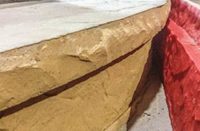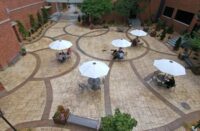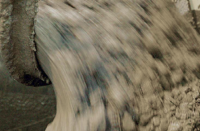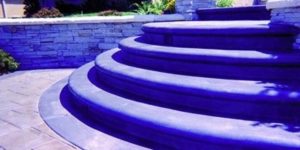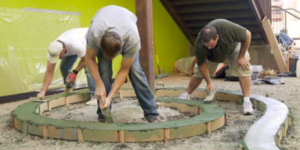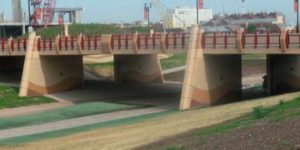
Radius or Not, Here I Come!
Ask most contractors and they’ll tell you that they’d rather pour thousands of feet of concrete than build one 20-by-4-foot staircase — let alone a radius one. The day of the pour, many will readily admit that there’s a knot in their stomach and that they wish the day had already come and gone… and left behind a perfect set of stairs.
Whereas a time machine doesn’t exist, there are a few products on the market today designed to make the hard task of building decorative stairways a little easier.
Fancy stepping
Contractors may be familiar with one such product — namely Step Liners — made by Stegmeier L.L.C., headquartered in Arlington, Texas. The company also has a manufacturing plant in Henderson, Nevada, right outside of Las Vegas.
“These are foam forms that adhere to the inside of formwork to create architectural profiles that match cantilevered edges of swimming pools,” says Bud Stegmeier, western division manager and son of the founder of the company. Basically, they’re used to mold a fancy edge on one step or a whole staircase. They’re not only easier to use, he contends, but they’re also quicker.
> “When you form steps out of wood, that wood is dense material. Water doesn’t penetrate it and it takes longer for the steps to set up,” he explains. “Step Liners are made of a porous material that will accept bleed water. This allows them to be stripped much, much earlier than conventional wood or steel step forms.”
“When you form steps out of wood, that wood is dense material. Water doesn’t penetrate it and it takes longer for the steps to set up,” he explains. “Step Liners are made of a porous material that will accept bleed water. This allows them to be stripped much, much earlier than conventional wood or steel step forms.”
And because the liners are porous, they don’t create suction. Unlike wooden forms that often pull little patches of concrete along with them, the foam forms let loose and will strip with very little finishing to be done.
“I was a contractor for a long time,” states Stegmeier. “And sometimes — if the customer didn’t want to spend the extra money — I’d use these Step Liners anyway and not charge them. Why? Because the steps stripped so much cleaner and the process saved me so much more labor.”
Step Liners are available in six profiles, with the one called “Safety Tread” worth its weight in gold, Stegmeier claims. If an architect specifies radius steps that have angled risers, which some counties and cities require on commercial buildings, “It can be a nightmare to build,” he notes. But a contractor can shape the forms into the desired radius and nail them to “straight up and down, plumb” formwork.
Stegmeier says these forms can be used for virtually any radius. Fiberglass reinforced strapping tape is applied on the side opposite the direction of the intended bend. The bending tape prevents the form from breaking on one side while allowing a radius to be compressed into the other side, he explains.
These one-time-use, expanded polystyrene forms are available in 4- and 8-foot lengths. Each form comes with its own disposable foam tool. “Since the forms can be stripped away so early, finishing usually involves misting the surface with a spray bottle and going over it with these tools,” says Stegmeier. “The foam profile tool doesn’t leave chatter marks like some metal tools do. It has a soft edge and it gives a clean finish.”
 It’s all in the form
It’s all in the form
According to Tim Wilson, general manager of Pacific Concrete Images in Laguna Hills, California, one of his company’s newest products “will bend into a 2-foot radius with no problem. Other forms are limited to the radius you can cut.”
Pacific Formliners, reuseable polyethylene forms designed to help contractors create stairs, have been on the market for about two years. “Our formliners are easy to flex, easy to cut, thus making them very versatile and easy to handle on the job,” Wilson maintains.
 On average, he says, you’ll get eight to 10 uses out of each Pacific Formliner, which typically sells for $3.50 a foot.
On average, he says, you’ll get eight to 10 uses out of each Pacific Formliner, which typically sells for $3.50 a foot.
They’re available in seven standard profiles, each with matching finishing tools made out of stainless steel. The forms come 9-feet long, 2-inches thick and either 6- or 7-inches tall. Custom forms up to 24-inches tall also are available as a special order.
Most contractors like the product because it’s reusable, Wilson says. “And if you’re doing radius steps, it’s definitely easier to form the radius with a Formliner. You don’t have to cut anything; you just have to bend it.”
 Usually, Wilson explains, contractors nail the Formliner to the inside of the wooden formwork. No release agent is necessary except you should spray the form with water before you pour the concrete. “Some people use a spray vegetable oil instead of water,” he says. “This makes it easier to strip the form away.” You can start at one end and work it off a little at a time, he adds, instead of pulling off the form all at once. It leaves a smooth, easy to-finish surface, he says.
Usually, Wilson explains, contractors nail the Formliner to the inside of the wooden formwork. No release agent is necessary except you should spray the form with water before you pour the concrete. “Some people use a spray vegetable oil instead of water,” he says. “This makes it easier to strip the form away.” You can start at one end and work it off a little at a time, he adds, instead of pulling off the form all at once. It leaves a smooth, easy to-finish surface, he says.
Look! Wood be gone
Plastiforms, another innovative product that can make building stairs easier, are plastic boards designed to replace their wooden formwork counterparts. Made out of lightweight high-density polyethylene with UV inhibitors, the boards feature end connectors that allow them to be attached together with just a snap. No nails are needed.
 Contractors like them, says Mike Lane, president of The Plastiform Co., because they’re so easy to use and because they last so long. “We’ve got a 10-year club going,” he says with a laugh. And that’s about how long they’ve been around.
Contractors like them, says Mike Lane, president of The Plastiform Co., because they’re so easy to use and because they last so long. “We’ve got a 10-year club going,” he says with a laugh. And that’s about how long they’ve been around.
“They’re very quick to set up because of the camlock clamp that we use,” he explains. “There’s a dovetail shape slot that runs the length of the board which allows the clamp to be installed anywhere by twisting it 90 degrees. For elevation changes, you just loosen the clamp and move the form up or down. It takes just a second.”
Contractors also have noted that the forms are time-savers. “I like the forms because I can strip them after four hours instead of going back the next day,” says Ron Clausen of CCC Construction in Caroll, Iowa.
The Plastiform boards are great for free-forming curved and radius work, Lane adds. The 2-by-4s will accommodate a 3-foot bend radius, while the 2-by-6s can be bent into a 4-foot radius. The boards can be stacked for radius work.
Currently, the boards are available in three widths — 31⁄2, 4 and 6 inches — and 12- and 15-foot lengths. In April, the company also plans to offer forms that are 8-, 10- and 12-inches wide.
On the rise
If you’re looking for an easy way to texture vertical concrete surfaces, Polystone Products of St. Paul, Minnesota, may have just the thing you’re seeking. About a year ago, the company nationally debuted its Versaliner, a polyurethane step form liner that can help create steps that look more like stone than concrete.
The reusable, finish-free, step-form system is designed to imprint a slate texture onto concrete stair risers and caps. (You’d still have to use a mat for the treads.) The product comes in 12-foot lengths with 2- and 3-inch cap pieces and separate riser pieces that range from 3 to 41⁄2 inches in 1⁄2-inch increments.
“The benefits are many,” says Bryan Greger, president of Polystone Products. “The system is tremendously faster and you get much better results. With this form liner, you’ll create steps that look they were made by a stonemason.”
Basically, a contractor attaches the liner to the formwork with brads and when the concrete’s set up, he strips it away. “You can use the liner again and again,” Greger says. “Maybe 100 times or more. It lasts as long as stamping mats do.”
As for radius work, “You can do a radius with no problem because you don’t have to cut into the corners,” he points out. “You just wrap the liner around them.”
Due to many requests at the World of Concrete, Greger says his company plans on introducing a one-piece system in varying sizes that will simulate both granite and slate textures by this summer.
